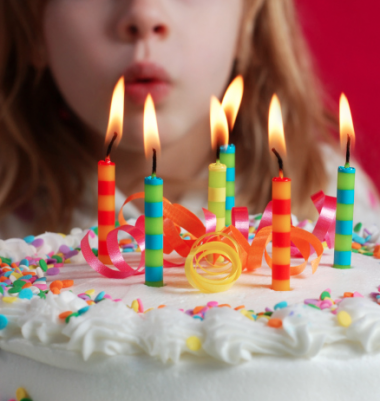Blowing out cake candles? It increases bacteria
A study shows that blowing candles on cake actually increases bacter

A study shows that blowing candles on cake actually increases bacteria by 1400 percent. That figure may seem unbelievable but it is a fact.
Blowing candles on the cake is a universal tradition. But after reading this you might want to give up the tradition for good. Blowing candles on the cake increases bacteria by 14 times, so think well before you rush to take that slice from the cake which has just had candles blown. The sweet temptation gets loaded with bacteria when candles are blown out. This was found by a research in South California. The saliva that spreads from blowing gets the cake icing ridden with bacteria.
Dr. Paul Dawson, a professor at Clemson University, conducted a study with his group. The team put a foil on top of a Styrofoam wheel in the shape of cake. Candles were placed on this wheel. Before blowing candles they all ate pizza to activate salivary glands. Then the candles were blown out. The bacteria were counted by diluting the frosting with sterilized water and then spread out on agar plates to grow(Agar plates are the standard solid support material for growing microorganisms).
The team found that there was a lot of bacteria and each blow had resulted in different types of bacteria. On average, blowing out the candles caused the frosting to grow 14 times as much bacteria. However, in one case, it was increased by more than 120 times, suggesting certain people transfer more bacteria than others. But, Dr Dawson said this new data shouldn’t ruin birthday parties.’In my opinion, you’re fine to eat a birthday cake if someone blew out the candles,’ he explained. ‘I don’t think you’d get sick.’ Human mouths are full of bacteria, and most of them are not harmful. Additionally, if blowing out candles on a birthday cake actually caused the spread of deadly diseases it would be obvious because of how common the practice is, especially in children. Dr Dawson said he might avoid the cake if he thought the candle-blower looked sick, but otherwise thought it was probably fine. The researchers wanted to help raise awareness of the health risks associated with birthday celebrations and “encourage others to take steps toward preventing the spread of bacteria.”
Inputs from dailymail.co.ukTo join us on Facebook Click Here and Subscribe to UdaipurTimes Broadcast channels on GoogleNews | Telegram | Signal


